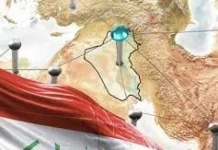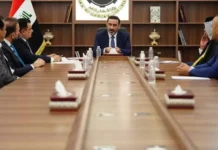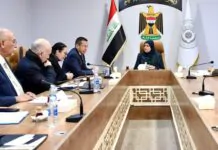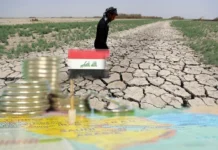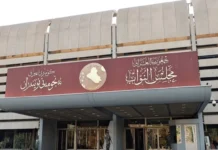American Magazine: Iraq Quietly Re-Enters International Trade
Money and Business A report by the American economic analysis magazine Procurement Magazine
examined the significant economic and geopolitical benefits and returns of the Iraqi Development Road initiative, extending from the Grand Faw Port to the Turkish border.
The report noted that it will be a viable alternative to other trade channels, competing with them in terms of shorter distances and lower costs, transforming the country into a regional logistics hub while creating a multi-source economy beyond oil alone.
The report notes that Iraq’s Development Road project represents a transformative $17 billion infrastructure initiative aimed at connecting the Gulf to Europe.
With global shipping facing challenges stemming from regional instability and bottlenecks such as the Suez Canal, Iraq is quietly redefining its role in international trade.
This logistics corridor, stretching from the Grand Faw Port in southern Iraq to the Turkish border,
represents a strategic alternative that will reshape supply and transportation chains between Asia and Europe.
This major project has been described as “one of the most important infrastructure projects in Iraq since the 1920s.”
This faster route delivers direct benefits to procurement by enabling faster supply routes, reducing storage costs, and improving responsiveness to market changes.
The global importance of Iraq‘s development route has been highlighted amid the ongoing Red Sea crisis, exacerbated by conflicts in the Middle East, where shipping delays have become commonplace.
In this context, the Iraqi land corridor offers a practical alternative.
In recent weeks, truck drivers from Poland and Germany have completed journeys from Europe to the Gulf via Iraq in just ten days, less than half the time required by sea through the Suez Canal.
The journey from Turkey to Kuwait now takes just seven days, and digital border crossings have reduced waiting times by 92%.
The TIR (Terrestrial International Transports International) system, which ensures the safe and efficient movement of goods across borders, is already operational, enhancing the flow of cross-border procurement and supply chains.
Hamad Al-Hakim, a transport infrastructure expert at the University of Baghdad, told the Middle East Observer earlier this year:
“The development road is expected to become a vital trade corridor, not only for Iraq but for the entire region.
By connecting the Gulf to Europe via Turkey, it will serve as a new Silk Road, revitalizing ancient trade routes and promoting economic integration.”
This corridor provides a practical alternative to the Suez Canal, meaning greater route diversification and a reduced risk of disruption, thus ensuring more reliable supply chains.
At the heart of the Iraq Development Road project is the Grand Faw Port, currently under construction in the city of Al-Faw.
This deep-water port features the world’s longest breakwater, at 14.5 kilometers long, and is expected to handle 7.5 million containers annually, capable of receiving the world’s largest container ships.
A 1,200-kilometer road and railway extend from the port to Turkey, and the project is expected to be fully operational by 2028.
In addition to the transportation infrastructure, the project plans to develop at least ten new cities along the railway route, along with several industrial zones and logistics centers. The development of these areas will provide new opportunities for local supply.
The development road is not just a logistics project; it represents a geopolitical transformation,
charting Iraq‘s transformation from a war-torn country to a pivotal regional link.
The project is supported by Turkey, Qatar, and the United Arab Emirates,
who recognize its potential to boost regional trade and reduce reliance on vulnerable maritime routes.
Kurdistan Region President Nechirvan Barzani said of the project:
“The Development Road Project represents a crucial step towards building a more stable and prosperous Iraq, based on a diversified economy and enhancing regional cooperation with neighboring countries.”
Türkiye‘s participation is pivotal, as it represents the northern endpoint of the corridor,
which will connect to Europe via the cities of Mersin and Istanbul.
“The project provides a catalyst for economic prosperity that can benefit the entire region,” said Ranj Alaaldin, a fellow at the Middle East Council on International Affairs.
As global trade networks seek to bolster their resilience in the face of geopolitical volatility,
Iraq is proving to offer not just a backup plan but potentially a major new artery for trade.
This project will redraw the region’s economic map, transforming Iraq into an alternative trade artery at the heart of Eurasia.
This means transforming the country from an importer of opportunities to an exporter of corridors,
creating a diversified economy that moves away from its reliance on oil alone.
About Procurement Magazine Quoted from Al Mada newspaper views 342 https://economy-news.net/content.php?id=57214
Iraq’s Oil Reserves Surpass 145 Billion Barrels
Iraq Amr Salem July 10, 2025 97 The Iraqi Minister of Oil, Hayan Abdul-Ghani, and other officials during their participation in the 9th OPEC International Seminar in Vienna, Austria.
Baghdad (IraqiNews.com) – The most recent figures for Iraq’s oil and gas reserves were publicly presented as part of the Iraqi government’s efforts to draw international investment to develop its hydrocarbon resources and play an important role in global energy markets.
During the 9th OPEC International Seminar in Vienna, the Austrian capital, Iraqi Oil Minister Hayan Abdul-Ghani announced that Iraq’s proven reserves exceed 145 billion barrels of oil and over 132 trillion cubic feet of natural gas.
Iraq’s oil and gas deposits represent untapped energy potential, and they provide Iraq with an opportunity to play a critical role in maintaining the world’s energy stability, according to Abdul-Ghani.
Abdul-Ghani stressed that guaranteeing energy security in the next years will need a firm commitment from governments to support all sorts of energy projects.
Fossil fuels continue to be a key element in meeting the world’s growing energy demand,
as well as a critical driver for supporting infrastructure expansion and clean and sustainable energy projects, particularly in developing countries that require economic assistance to develop critical sectors such as health, education, and basic services.
Abdul-Ghani stressed that ongoing investment in oil and gas production projects is critical to ensuring global energy stability and inclusive economic growth.
The current level of investment does not match predicted demand,
particularly given the continued growing population globally and the ongoing industrial expansion.
The Iraqi oil minister urged governments to provide adequate financing to achieve an equilibrium in securing supplies from traditional energy sources like oil and gas and investing in sustainable energy.
Additionally, Abdul-Ghani recommended setting up shared sovereign funds, a risk guarantee scheme, and tax breaks to encourage private investment in energy projects. https://www.iraqinews.com/iraq/iraqs-oil-reserves-surpass-145-billion-barrels/
Customs: Five Transit Flights Successfully Passed Through Iraq Under The TIR Agreement.
Yesterday, 15:44 Baghdad – INA – Mohammed Al-Talibi The General Authority of Customs announced today, Wednesday, the successful passage of five transit flights through Iraq in accordance with the TIR Agreement, while indicating that all land transit ports have been approved by the International Road Transport Union.
The Director of Transit at the General Authority of Customs, Ihab Talib Khalifa, told the Iraqi News Agency (INA): “The electronic lock system was applied to nine experimental flights coming from Umm Qasr towards the dry port,” indicating that
“the monitoring was for drug shipments after the issuance of a decision to monitor drug shipments
from their entry into the country until their arrival at the dry port affiliated with the Central Region Directorate in Baghdad at the General Authority of Customs.”
He explained that “the shipments were tracked using a GPS system installed on an electronic lock that secures the container,” noting that
“the purpose of this matter is to limit smuggling and ensure the safe arrival of drug shipments for distribution, and to activate the role of oversight under the direction of the Director General of the General Authority of Customs, as we are about to introduce and track other types of shipments, including chemicals.”
He continued, “The transit issue has been activated and the international TIR agreement has been implemented.
Five successful flights were received and reached their destination country by passing through Iraq,which was the transit corridor.” He emphasized, “This work will continue to enhance Iraq‘s role in international trade, as well as Iraq‘s strategic regional location.
Work on development is also ongoing.”
He explained that “through purely Iraqi efforts, and with the cooperation and logistical support provided by the Border Ports Authority from a technical standpoint, the National Data Center affiliated with the General Secretariat of the Council of Ministers, and the support of all officials, all land transit ports have been submitted to the International Road Transport Union, and all of them receive transit trucks, in addition to the ports designated for the entry of pharmaceutical shipments at the present time.”
He pointed out that “the TIR system will expand in the near future, stage by stage, to include shipments of chemical materials.” https://ina.iq/ar/economie/238237-.html
Losing Privatization
Economic 2025/07/10 Yasser Al-Mutawali Any talk of privatization during this period is a losing and useless matter because it is too late. Twenty years have passed since important calls to privatize idle and losing companies and factories. Why? To understand the meaning of privatization with a simple definition,
it is the transfer of idle government or public factories and plants that were and still are a burden on the working budgets to the private sector to revive them and operate them
after the management of these government factories was unable to restart them and make them productive, after a disastrous failure faced by those administrations under the pretext that the production costs are high and they are unable to achieve them, and the reason was certainly
Paul Bremer‘s policy of opening up the market without addressing the effects of indiscriminate imports on domestic production resulted in loss-making industries.
These factories and companies continued to consume budgets without producing any output,
leading to disguised, flabby unemployment that has been, and continues to be, a burden on the state.
Economic experts have called for its privatization, convinced that the private sector is capable of operating it and making it productive and profitable.
An article by my colleague Thamer Al-Haimus caught my attention,
in which he raised the issue of privatization and titled it “National Privatization.”
As someone who is interested in economic affairs and has followed the stages of challenges that the Iraqi economy has gone through, I find that merely thinking about privatization is nothing more than an invitation to loss.
The reasons are many and varied,
foremost among them is the passage of 20 years without any benefit with the accumulation of losses, and
secondly, the decline in the productive life of these factories and companies has been eaten away by time, and
thirdly, they, the factories, have become unfit to keep pace with the great development left behind by globalization and the third technological revolution, followed by the
fourth, the science of technology, robotics and artificial intelligence. So, what privatization?
Are we talking?
The technological and technical development achieved by China and some of the major industrial countries has reached an unimaginable level.
So what is the point of privatization in an age of modern technology and future jobs?
These companies and factories have become old and have gone out of service automatically without any decision, and the need dictates how to liquidate them and benefit as much as possible.
Some of these sites are being invested in modern production and service fields that are in line with the nature of the stage.
That is why I titled this article “Lossy Privatization.”
Therefore, the liquidation must be studied and organized according to basic needs.
Based on the above, the state-private partnership (PPP) approach represents a reasonable model of partial or participatory privatization, a model that is currently prevalent worldwide without the state losing its assets.
This model maximizes production, productivity, and the efficiency of technological development and
financing by involving market forces in national industrial activity.
However, the country needs to enact a law on state-private partnerships, which remains a hot topic of debate in the House of Representatives to this day. https://alsabaah.iq/117220-.html
For current and reliable Iraqi news please visit: https://www.bondladyscorner.com

